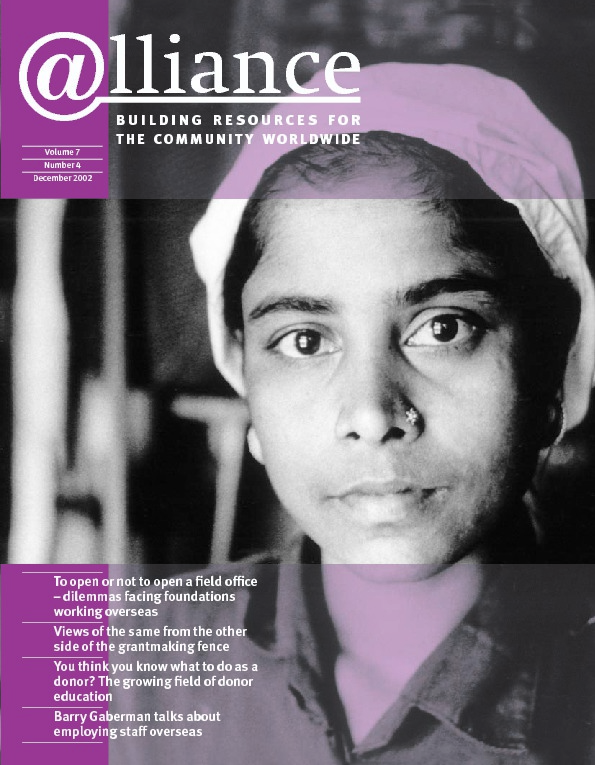South Asia’s fertile and accessible lands have attracted people from north, east and west for hundreds of years. Unfortunately, none of the three major countries in South Asia, Bangladesh, India, and Pakistan, has ever had a strong central government capable of managing resources efficiently and willing to ensure equitable access to them. As a result, people became involved in community and voluntary activities in order to meet their own needs.
In all three countries, governments over the years have provided tacit support to the expansion of the voluntary sector.
Supporting the voluntary sector
As early as 1860, the Indian colonial government introduced legislation to promote (or to keep an eye on) the sector. The government of independent India provided support to a large number of Gandhian-based organizations working for the development of the country. This later expanded to other types of voluntary organization, especially in the social welfare sector.
In Pakistan (and also in Bangladesh, then part of Pakistan), the government, by providing monetary support, encouraged community and voluntary organizations involved in delivery of goods and services as well as giving and volunteering in government-initiated programmes.[1] Involvement in these was later found to be helpful in keeping people away from public agitation. Young educated people, deprived of access to jobs and/or political office, often took refuge in third sector organizations to fulfil some of their aspirations.
In Bangladesh, the struggle for independence and the destruction and misery it brought forced many altruistic people to organize grassroots communities to meet their own needs. These new organizations, supported by international relief organizations and foreign governments, eventually grew very large and adopted a holistic approach to development interventions.
The legacy of different histories
A state-sponsored ‘space’ was created in India for voluntary sector development. In Pakistan the authoritarian nature of the government constricted independent growth of the voluntary sector and forced voluntary organizations to ‘play safe’. In newly independent Bangladesh, the main lifeline of the voluntary sector was overseas funds. Thus, owing to their different histories, the voluntary sector, especially the large organizations, relates to the government in different ways in the three countries. In India, the voluntary sector is hardly involved in major social and/or political issues or in influencing public policy. In Pakistan, the sector always tends to be aligned with the establishment (the armed forces for most of its history). In Bangladesh until the early 1980s, even the large voluntary organizations kept away from any type of political debate and avoided actions not liked by the government. As they grew in size and confidence, some organizations began to think of themselves as alternatives to the state, or at least to political parties, being involved both in the articulation of interests and in the providing of essential services. One NGO leader said in an interview that the ultimate goal of NGOs is to occupy state power.
Before the 2001 general election in Bangladesh, a large network of NGOs went as far as proposing to the government to mobilize individual NGO members to support the government party in return for party tickets for half the parliamentary seats for NGO leaders (the network promised to do this but the government did not accept or could not accept it). The government lost the election and the then opposition party formed the government. Having observed some NGO leaders’ attitudes and aspirations, it is now cracking down on those NGOs and their leaders. The government arrested some NGO leaders on charges of treason (for publicizing alleged atrocities against religious minorities). The new government has formed a committee to frame a new law to restrict NGO activities. The NGO Affairs Bureau (the government department that regulates NGOs that receive overseas funds) has blocked overseas funds to five major NGOs alleged to have been involved in political ‘activities’ on behalf of the previous government party. In the new national budget (2002-03), the government has also imposed taxes on the commercial activities of NGOs (except for microcredit programmes), irrespective of their purpose and use (the surplus from these commercial activities is mostly devoted to the poverty alleviation programmes of the respective NGOs).
South Asia, especially Bangladesh, is going to be a good ground for testing third sector-government relationships. NGO communities the world over should keep an eye on how things unfold there.
1 For example, the Rural Works Programme (RWP) and later the Food-for-Work Programme (FWP).
Dr Samiul Hasan is senior fellow and coordinator of the Asian Third Sector Research Unit at the University of Technology, Sydney. He can be contacted at samiul.hasan@uts.edu.au
See http://www.asianphilanthropy.org for the website of the Asia Pacific Philanthropy Information Network
Much of this article is based on material contained in Samiul Hasan’s recent publication,
Philanthropy and the Third Sector in South Asia: A chronicle (UTS, Sydney,
October 2001).
To order email cacom@uts.edu.au or fax +612 9514 5583. Price US$12.50 inc postage.



Comments (0)